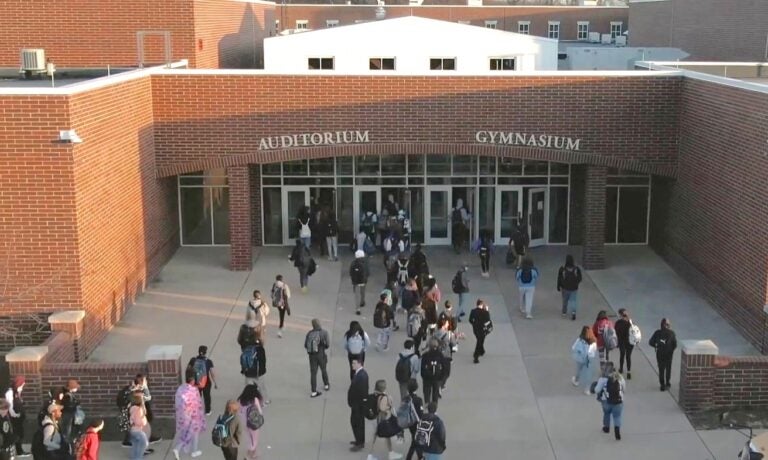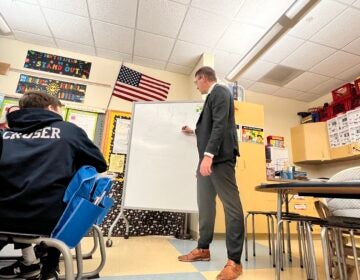‘Can’t ignore that’: Delaware auditor pledges to scrutinize school district’s sudden financial crisis and 10% tax hike
Auditor Lydia York said Appoquinimink’s shortfall is a serious issue. Lawmakers wrote that it “warrants urgent, independent scrutiny.’’
Listen 1:18
Students flood into Appoquinimink High, one of three high schools in the fast-growing district. (Appoquinimink School District)
From Philly and the Pa. suburbs to South Jersey and Delaware, what would you like WHYY News to cover? Let us know!
Delaware’s state auditor pledged Monday to find out the cause of severe and sudden financial issues that recently surfaced at the Appoquinimink School District.
“The bottom line was they ended up short of money, so that’s a real problem,’’ Auditor Lydia York told WHYY News. “We’re not in the habit of something clanging this loudly in one of our school districts. We can’t ignore that.”

York spoke shortly after a bipartisan group of state lawmakers urged her in writing to conduct a full financial audit of the fast-growing district in the Middletown area of southern New Castle County.
Last week, the school board in the district known as “Appo” approved a 10% property tax increase without going to voters to approve a referendum. That unusual action followed the sudden resignation of finance director Eric Loftus and the district’s revelation of a “major accounting error that has placed the district in unexpected financial jeopardy,’’ the area’s seven state lawmakers, including veterans Sen. Stephanie Hansen and Rep. Kevin Hensley, wrote.
“Given the size and continued growth of the Appoquinimink School District, and the substantial public resources it administers, this situation warrants urgent, independent scrutiny,’’ the lawmakers wrote.
The district had reported that it did not have the necessary reserves on June 30, the end of fiscal 2025, to comply with a state regulation to have enough money in reserves to cover two bi-weekly payroll periods. The district reported a $3 million cash balance on June 30, but under the state rule, it needed $4.2 million.
Appoquinimk has more than 13,000 students, the second-most of Delaware’s 19 individual school districts.
Matthew Burrows, superintendent at Appoquinimink, would not agree to an interview about the district’s financial issues or how they surfaced.
But he sent WHYY News a written statement that said while he doesn’t object to a state audit, the district is already “conducting a thorough examination of our financial situation to take corrective action to ensure this never happens again. This review will be conducted by individuals with school finance experience outside of our district.”
The lawmakers’ letter noted that the 10% property tax increase on residents came after the district made several assurances that none would be needed. They wrote that the audit was needed to:
- Determine the cause and full extent of the accounting error.
- Evaluate whether fraud, mismanagement, or negligence contributed to the district’s current financial condition.
- Assess whether the district has been in compliance with state laws, internal controls, and proper accounting procedures.
- Identify any systemic issues that could pose ongoing risks to fiscal integrity.
During an interview Monday morning, York said she has also received other requests from politicians and community activists to dig into the financial crisis, but had not yet seen the state lawmakers’ letter.
While York didn’t commit to conducting a full financial audit, she agreed her office had an obligation to get to the bottom of the financial crisis. The auditor is a statewide elected official whose office routinely audits the construction projects of the independent school districts, as well as how they spend state money.
“We’re going to do something. We just have to sort of collect ourselves, figure out what’s going on,” and collaborate with other parties, including the Delaware Department of Education, before proceeding, York said. “The first thing we’re going to want to do is understand what happened. Once we understand what happened, we’ll be in a much better position” to propose solutions.
One line of inquiry, York said, should be for her office to see if “this is a manifestation of something we may have seen previously, which is some confusion around how some of these funds get accounted for. And it could be that simple, actually.”
No matter the reason it occurred, York said it’s paramount that districts meet their mandated state fiscal obligations.
“The real problem here is that they’re failing to meet a parameter that’s required of all the school districts, which is having two paychecks banked,’’ York said. “That’s a more serious issue.”
This story was supported by a statehouse coverage grant from the Corporation for Public Broadcasting.

Get daily updates from WHYY News!
WHYY is your source for fact-based, in-depth journalism and information. As a nonprofit organization, we rely on financial support from readers like you. Please give today.







